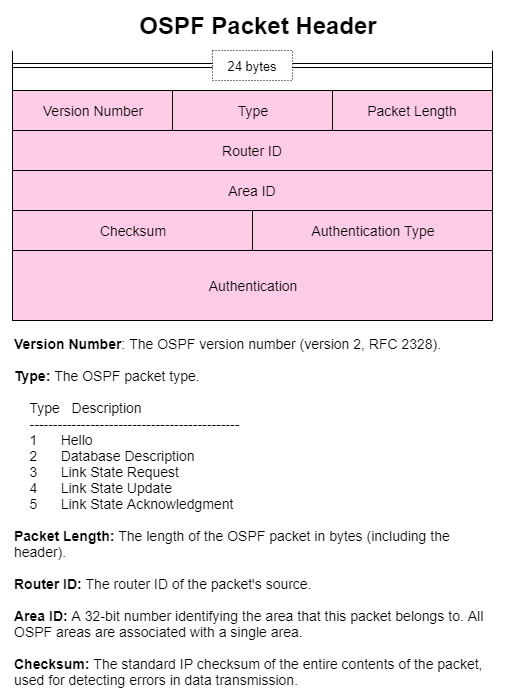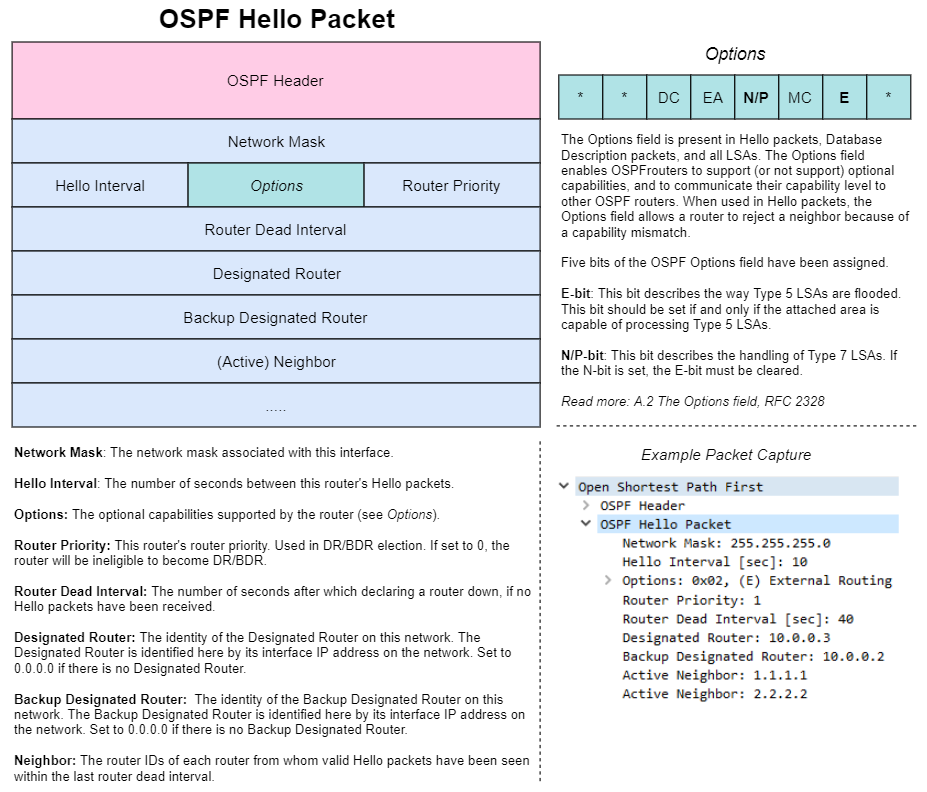Happy New Year 2020! I know it's funny to start a new year with a Christmas calendar, but I wanted to share my tweets here on my blog as well. In previous years, I've done blog posts and YouTube videos (you can find both here in my earlier posts in this blog), but this year I've created special tweets for my networking Christmas calendar. Hope you enjoy!
Day 1️⃣ : OSPF uses a two-level hierarchy, consisting of the backbone area and non-backbone area(s). Using OSPF areas reduces the complexity and size of the link-state database.
In a multi-area design, why must all areas connect to the backbone area?
Day 2️⃣ : There are five distinct OSPF packet types. Each packet serves a different purpose in the operation of OSPF. Other than the Hello packet, all OSPF packet types deal with lists of LSAs.
Day 3️⃣ : Every OSPF packet starts with a standard 24-byte header. This header contains all the information necessary to determine if the packet should be accepted for further processing (read more in Section 8.2, RFC 2328).
Day 4️⃣: OSPF Hello packets are used to discover and maintain neighbor relationships. All routers connected to a common network must agree on certain parameters. If these parameters do not match, a neighbor relationship will not form.
Day 5️⃣: OSPF Database Description packets are exchanged when an adjacency is being initialized. They describe the contents of the link-state database. Multiple packets may be used. One of the routers is designated as the master, the other as the slave.
Day 6️⃣: After the Database Description packet exchange, a router may find that parts of its link-state database are out of date. The Link State Request packets contain a list of those more up-to-date LSAs that need to be obtained from the neighbor.
Day 7️⃣: OSPF Link State Update packets implement the flooding of LSAs - each carrying a collection of LSAs. Several LSAs may be included in a single packet. Multiple updates may be required to send all LSAs.
Day 8️⃣: OSPF Link State Acknowledgement packets are used to make the flooding of LSAs reliable. Flooded LSAs are explicitly acknowledged. Each acknowledged LSA is described by its LSA header, which uniquely identifies the LSA and the LSA’s current instance.
Day 1️⃣ : OSPF uses a two-level hierarchy, consisting of the backbone area and non-backbone area(s). Using OSPF areas reduces the complexity and size of the link-state database.
In a multi-area design, why must all areas connect to the backbone area?
Day 2️⃣ : There are five distinct OSPF packet types. Each packet serves a different purpose in the operation of OSPF. Other than the Hello packet, all OSPF packet types deal with lists of LSAs.
Day 3️⃣ : Every OSPF packet starts with a standard 24-byte header. This header contains all the information necessary to determine if the packet should be accepted for further processing (read more in Section 8.2, RFC 2328).
Day 4️⃣: OSPF Hello packets are used to discover and maintain neighbor relationships. All routers connected to a common network must agree on certain parameters. If these parameters do not match, a neighbor relationship will not form.
Day 5️⃣: OSPF Database Description packets are exchanged when an adjacency is being initialized. They describe the contents of the link-state database. Multiple packets may be used. One of the routers is designated as the master, the other as the slave.
Day 6️⃣: After the Database Description packet exchange, a router may find that parts of its link-state database are out of date. The Link State Request packets contain a list of those more up-to-date LSAs that need to be obtained from the neighbor.
Day 7️⃣: OSPF Link State Update packets implement the flooding of LSAs - each carrying a collection of LSAs. Several LSAs may be included in a single packet. Multiple updates may be required to send all LSAs.
Day 8️⃣: OSPF Link State Acknowledgement packets are used to make the flooding of LSAs reliable. Flooded LSAs are explicitly acknowledged. Each acknowledged LSA is described by its LSA header, which uniquely identifies the LSA and the LSA’s current instance.








Comments
Post a Comment